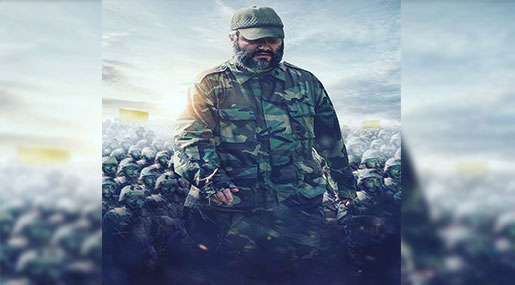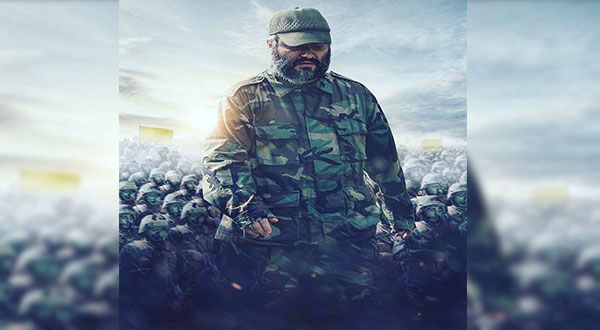
The Grandson of the ’Porter’ and the Son of a Watermelon Vendor

Mohammad Nazzal
Mahmoud left this world in the year of the "Naksa" [Arabic for "setback", a term for the defeat of the Arabs during the 1967 Six-Day War]. He did not live with his first grandchild. But he was overjoyed for more than five years. Every time he returned to the house, he would carry some sweets from the shop. After all, the grandson is more precious than the son. He used to play and babble with him. But did he know that this child in his hands, along with his friends, would change his world? The world that has hurt him, saddened him, and bent his back while he worked as a porter at the Beirut port.

That harbor was full of tales of the weary people of that generation. This was the grandfather of Imad Moghniyeh. Mahmoud left Jabal Amel, the land of his ancestors, and lived in the capital in pursuit of his livelihood. He brought his son Fayez with him to work. The boy was no more than 12 years old.
They lived together in a room they rented in a shared residence, in one of those houses we see in Beirut's cultural heritage neighborhoods. There, in the area of Msaytbeh, the grandfather and son formed their first relationship with the capital of weariness.
It was the land of estrangement at home. It was the land of migration of that generation from the countryside, where systematic deprivation, institutional poverty, and programmed marginalization existed for the benefit of the center.
Fayez will work at a restaurant (Fawal) in downtown Beirut which was next to the Cinema "Rivoli". For the first time, the boy will learn what a cinema is. He will just see it from the outside. The restaurant was owned by the Al-Hashim family. They were friendly with him. (According to the narrator) they belonged to the "Christian brothers".
He kept working for them until he turned twenty years old. He got married, and the adventure began. His lifelong companion worked at the Makassed Hospital. He thought of ways to open his own restaurant. He did it in the end. He opened it, not in the heart of the capital but at the border of the southern suburbs (the old Sidon road).
He went to work at dawn, and sometimes, did not return until midnight. He would not see his children for a week; he leaves while they are asleep and returns while they are asleep. Then the civil war began. His shop was located in the "seam zone". Work was halted. What should he do?
Should he return to the South - to the village he left when he was a child -with him his family and eldest son Imad. The latter helped his father build a small house, with his bare hands, using the money the father collected from his work. The house was being constructed for about nine months.
Later, after things calmed down, the family returned to Beirut. There was no livelihood in the south of Lebanon. No work. Abu Imad, one of those who cannot sit without work, was looking for a new cart. He will sell watermelons on a cart. Then, he will open a small shop, in Chiyah, to sell vegetables. Then the "Israeli" invasion of Beirut takes place in 1982.
The family returns to the south yet again. Then, a return to Beirut. There is no escape. Back to work: a new restaurant again (chicken, beans [Foul], chickpeas, etc.). This time the blessings poured in. Once, Um Imad asked him: Where did you get this [money]? She was keen, and still is, on the "halal". But she was not as keen as he was about it. He told her it was because of the Syrian entry into the area where his shop was. All the owners returned to their shops and repaired the damage. That brought in many workers.
All these people want to eat. Sometimes fate smiles amidst anxiety. At the time, Abu Imad's situation was the same, while Imad, as the whole world later knew, was changing the equations of the major powers in the region from the heart of Beirut.
This is a paradox for history. The young man did not ask his father to leave his shop until many years later, and only because he feared for his life, after an incident that happened there. Abu Imad did not leave this world until he saw how his world changed. He did not leave until his three sons, and later his grandson, left [this world] on the same path.
On the occasion of commemorating Fayez Moghniyeh, Sayyed Hassan Nasrallah spoke about that generation and almost cried in that moment: "Whoever reads memoirs or listens to anyone about that stage, will cry. He won't be able to bear ... the generation of those hard workers, and how they migrated from their villages to Beirut and its environs, to what Sayyed Musa al-Sadr called the belt of misery in Ouzai, Hay El Sellom, Karantina, al-Nabaa, Burj Hammoud and Tel Zaatar."
Nasrallah seemed like someone who did not want to say everything. He, himself, is the son of that generation as well. He is the son of a vegetable vendor in the Sharshabouk neighborhood of Karantina.
He is well acquainted with the nasty descriptions and adjectives, which were used to describe the grandfathers and fathers of that era. Not all that is known is said, not for security reasons, but this time for the sake of a memory he is keen on keeping people from remembering:
"How did these people come from the countryside? What did they do, and how hard they worked, night and day? What was the type of jobs they endured to do? These are the generation of the fathers. Only those who lived in this generation know the details." When Sadr appeared on the Lebanese arena, Abu Imad was one of those who lived the moment of hope. He was one of those who saw him as a savior. So he rushed to one of the training courses sponsored by the "Imam". Imad Moghniyeh is a legitimate son of this generation, a grandson of that generation. He came from there and remained loyal to that suffering, to that memory, which afflicted his flesh and blood.
Source: Al-Akhbar Newspaper, Translated by website team
Comments



